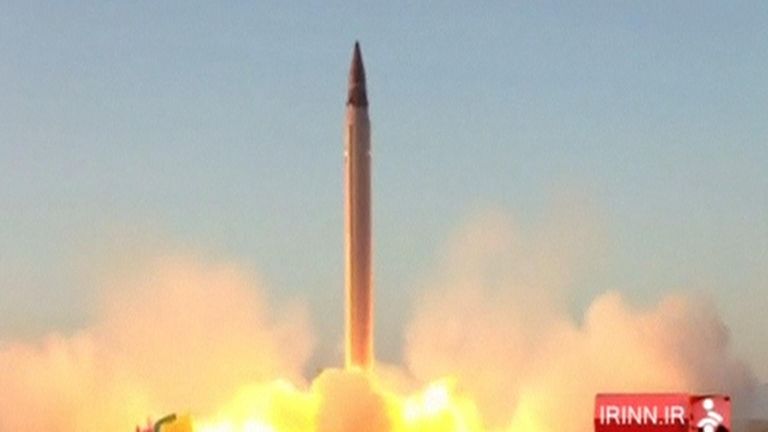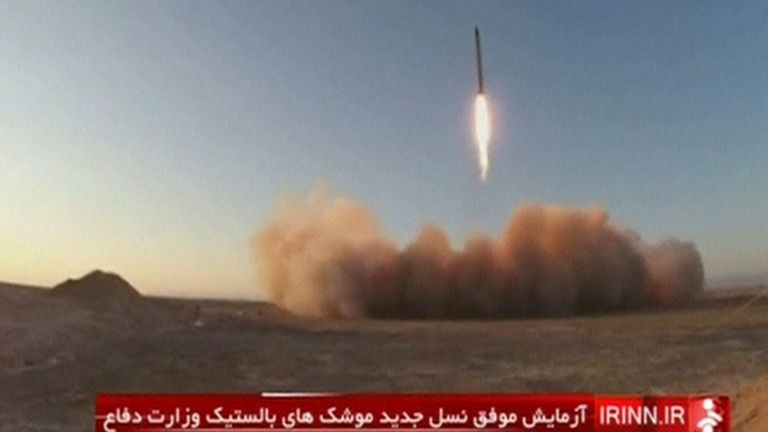By Deborah Haynes, foreign affairs editor
The US secretary of state has said he is willing to travel to Iran for talks following reports that Iran test-fired a medium-range missile.
Mike Pompeo also called on Britain, Japan and other nations to join a US-led maritime force to protect international tankers and other ships passing through the Strait of Hormuz.
The Royal Navy this week started its own escort mission to guard British-flagged vessels against the threat of an Iranian attack as they transit through the waterway.
Jeremy Hunt, in one of his last acts as foreign secretary, said Britain wanted to build a European-led maritime force but there is no sign of that emerging anytime soon.
Mr Pompeo was asked in an interview on Thursday if he would be willing to go to Tehran.
Advertisement
"Sure. If that's the call, I'd happily go there… I would welcome the chance to speak directly to the Iranian people," the top US diplomat told Bloomberg TV.
Tensions between Iran and the United States have ratcheted up since last year, when President Donald Trump withdrew the United States from the Iranian nuclear deal, saying it was not strong enough.
More from Iran
Washington also re-imposed sanctions on Tehran.
President Trump and Iranian leaders have both publicly said talks were possible, but the prospect for dialogue appeared to recede on Wednesday when the top military adviser to Iran's Supreme Leader Ayatollah Ali Khamenei said Tehran would not negotiate with Washington under any circumstances, according to the Reuters news agency.
The relationship between the two countries has come under increased strain over the past three months following attacks on oil tankers in the Strait of Hormuz off the coast of Iran.

Stoking tensions further, Iran on Wednesday reportedly tested what appeared to be a medium-range ballistic missile, according to a US defence official quoted in US media.
The missile was launched from the southern coast of Iran and landed east of Tehran, the official was quoted in the New York Times as saying.
They added that it flew about 1,100 km – about 680 miles – and stayed inside Iran for the entire flight.
Missile launches are not a violation of the nuclear deal that Iran signed in 2015 with the United States and five other world powers, including the United Kingdom. President Trump, however, wants to see Tehran's missile programme curbed as part of a new deal he wants to hammer out with the Iranian regime.

In a separate interview broadcast by Fox News, Mr Pompeo said that Washington had already asked Britain, Japan, France, Germany, South Korea, Australia and other nations to join a planned maritime security initiative in the Middle East called Operation Sentinel.
"Every country that has an interest in ensuring that those waterways are open and crude oil and other products can flow through the Strait of Hormuz needs to participate," Mr Pompeo said.
A senior diplomat in Japan, Washington's key Asian ally, told Reuters that Mr Pompeo had talked with Prime Minister Shinzo Abe by telephone on Friday, but that Japan was not in a position to decide if oRead More – Source
By Deborah Haynes, foreign affairs editor
The US secretary of state has said he is willing to travel to Iran for talks following reports that Iran test-fired a medium-range missile.
Mike Pompeo also called on Britain, Japan and other nations to join a US-led maritime force to protect international tankers and other ships passing through the Strait of Hormuz.
The Royal Navy this week started its own escort mission to guard British-flagged vessels against the threat of an Iranian attack as they transit through the waterway.
Jeremy Hunt, in one of his last acts as foreign secretary, said Britain wanted to build a European-led maritime force but there is no sign of that emerging anytime soon.
Mr Pompeo was asked in an interview on Thursday if he would be willing to go to Tehran.
Advertisement
"Sure. If that's the call, I'd happily go there… I would welcome the chance to speak directly to the Iranian people," the top US diplomat told Bloomberg TV.
Tensions between Iran and the United States have ratcheted up since last year, when President Donald Trump withdrew the United States from the Iranian nuclear deal, saying it was not strong enough.
More from Iran
Washington also re-imposed sanctions on Tehran.
President Trump and Iranian leaders have both publicly said talks were possible, but the prospect for dialogue appeared to recede on Wednesday when the top military adviser to Iran's Supreme Leader Ayatollah Ali Khamenei said Tehran would not negotiate with Washington under any circumstances, according to the Reuters news agency.
The relationship between the two countries has come under increased strain over the past three months following attacks on oil tankers in the Strait of Hormuz off the coast of Iran.

Stoking tensions further, Iran on Wednesday reportedly tested what appeared to be a medium-range ballistic missile, according to a US defence official quoted in US media.
The missile was launched from the southern coast of Iran and landed east of Tehran, the official was quoted in the New York Times as saying.
They added that it flew about 1,100 km – about 680 miles – and stayed inside Iran for the entire flight.
Missile launches are not a violation of the nuclear deal that Iran signed in 2015 with the United States and five other world powers, including the United Kingdom. President Trump, however, wants to see Tehran's missile programme curbed as part of a new deal he wants to hammer out with the Iranian regime.

In a separate interview broadcast by Fox News, Mr Pompeo said that Washington had already asked Britain, Japan, France, Germany, South Korea, Australia and other nations to join a planned maritime security initiative in the Middle East called Operation Sentinel.
"Every country that has an interest in ensuring that those waterways are open and crude oil and other products can flow through the Strait of Hormuz needs to participate," Mr Pompeo said.
A senior diplomat in Japan, Washington's key Asian ally, told Reuters that Mr Pompeo had talked with Prime Minister Shinzo Abe by telephone on Friday, but that Japan was not in a position to decide if oRead More – Source












